Matthew Ratz has ample experience in most thespian matters, but directing community theater is a new avenue for the North Potomac resident. His first official venture is at the helm of the British Players’ production of Ronald Harwood’s “Quartet” from March 9 through 24 at Kensington Town Hall.
The British Players, formerly known as the British Embassy Players, has been performing traditional British theater in the metropolitan area for more than 50 years, first at the British Embassy in D.C., and since 2005, in Kensington.
By day, Ratz, who holds bachelor’s and master’s degrees from the University of Maryland, serves as executive director of On Our Own of Prince George’s County, a mental health and substance use wellness and recovery drop-in center; he previously taught English at Poolesville High School, Montgomery College and Howard University. His wife, Naomi Ratz, is also in the business; she teaches drama and other arts genres at Winston Churchill High School in Potomac, and acts in and directs community theater productions.
In anticipation of his directing debut, Ratz answered CultureSpotMC.com’s questions about his background and his new venture.
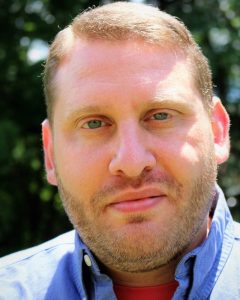
What brought you to the metropolitan area?
I came to the area in 2002 (from Woodmere, New York) to attend the University of Maryland College Park. In my sophomore year, I met Naomi; we were both founding members of Kol Sasson, the Jewish a cappella group on campus. We married in 2006, just as she finished her B.A. and I, my master’s degree. Naomi grew up in Silver Spring and much of her family lived in Montgomery County, so we decided to “stay put.”
What were your career aspirations during childhood? What did your family want you to do?
My earliest career aspiration was to be an ice hockey coach. I distinctly remember a drawing of myself that I made when I was 9, and it was me with a ponytail and a beard holding up the Stanley Cup–which is strange because I did not play hockey, or any sport. Looking back, the only thing that came true about that drawing is that I have a beard.
I don’t remember getting pressure from my family to go into one field over another. I studied English literature and film in college, and I remember many conversations about whether that was a “practical” pursuit. Throughout my upbringing, the expectation wasn’t ever to go into a specific field or industry, but doing meaningful and rewarding work was highly valued.
Did you take part in theater in high school and college?
I had a walk-on role in eighth grade in a play called “Happily Ever, Once Upon,” but didn’t take part in any plays in high school. In freshman year at Maryland, I wrote a one-act called “Gossip” that was accepted into the Maryland Original Works Festival. I was taking Theater 101 at the time, so I recruited some classmates to perform with me, and we put on the show in the spring of 2002. Later, while an exchange student at the University of Sheffield in England, I was cast as Baptista in the musical “Kiss Me, Kate.” That was my first exposure to musical theater, and the camaraderie I built with my castmates during that run left an indelible impression on me. I still stay in touch with many of my friends from that production despite our distance.
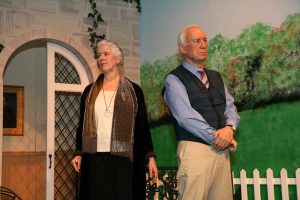
Did your love of theater inform your teaching English?
Very much. In fact, in my first-year teaching at Poolesville High School, I organized the school’s first-ever Shakespeare Festival. I recruited student volunteers and collaborated with the costume shop at Montgomery College to get some Renaissance costumes, and on April 23 (Shakespeare’s birthday) we roamed the halls reciting soliloquies and sonnets. During the lunch break, we hosted a miniature Renaissance Festival in one of the school’s courtyards. I also used an innovative approach to teaching Shakespeare with my class of 12th graders; I built a unit wherein students studied–in small groups–one of five different Shakespearean works using an approach called Literature Circles. I wrote up a unit summary, and had the article published in the peer-reviewed journal, The Kappa Delta Pi Record.
Do you prefer acting or directing–and why?
I love acting in theatrical and cinematic productions. I love the experience of trying on another person’s “skin” and living life through his eyes. Many people say that acting is like playing pretend, but for me, it’s more like having a short-term vicarious experience; I like to immerse myself in the life and experiences of the fictional character, and I’ve been honored to play some unique characters in my rather short time on stage and screen.
I got to play disgraced congressman Anthony Weiner in an original musical about his demise; the maniacal king in the Edgar Allen Poe story “Hop Frog”; a cynical Catholic priest who tries to give advice to a bikini model in a one-act called “Swimwear”; a corporate cog whose soul has been completed devoured by his employer in a short film called “Live Fish”; and recently, the jolly, eternally-optimistic chimney sweep Bert in “Mary Poppins.” Also, just the other night, I played a lascivious demon with the personality of Harvey Weinstein for a web-series currently under production. I’ve really adored all the different worlds I’ve gotten to be a part of.
Directing, on the other hand, has been a fundamentally different experience. The work of directing a full-length is significantly more demanding in scope. Instead of trying on the persona of a single character and living in his world, I’ve had to develop a pretty deep awareness of all the characters’ personalities and back-stories and figure out their relationship dynamics. Instead of memorizing one person’s lines and blocking cues, I’ve had to envision– almost from a blank page– the entire universe these characters would inhabit.
I’m a very visual person, so when I read a script, I usually imagine–in vivid detail– how scenes would play out. But it’s hard to transfer those images out of my brain and into the minds and hearts of both a cast and a crew.
I tip my hat to people who have been directing theater for a long time because there are so many details to think about, and the “work” of the production goes on not only throughout the several months of the rehearsal cycle, but for several weeks before it, through casting and production team development, and then through the entire run of the show and its aftermath.
I have been supported by a strong production team, and I have witnessed how many hands are needed to put up a first-rate production. I would take on the director’s job again under the right circumstances, but I am equally eager to receive direction. I’ve learned much through this directing experience, and I am eager to channel these lessons into my on-stage work.
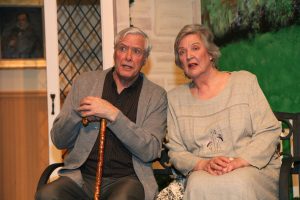
How do you find balance your day job, your theatrical avocation and your family?
I have learned the hard way what happens to me when I don’t prioritize my passions. Through many previous jobs, I allowed myself to be swallowed by my duties.
Part of my role (at On Our Own), as a peer support person, is to model wellness and promote recovery. I’ve never been in a position before where my own mental health was prioritized. As a result of this pursuit, it’s become much clearer to me that I need to create space for the things I am passionate about– like theater, poetry, positive social relationships– because these are the uplifting pursuits that keep me well.
I will admit, as a spouse and father to two young children, I sometimes feel “pulled away” by my many theatrical commitments. I know it poses a hardship on Naomi and on our boys for me to be night after night in rehearsal and performance. However– and I’ll reiterate that previous jobs metaphorically swallowed me whole– I believe my family is much happier when I am happy and being involved in performance makes me very happy.
How did you get involved with the British Players? You say this is your first community theater directing gig…what are the challenges and joys?
I’m lucky to have found many dear friends, mentors and confidants through community theater and short film. These individuals have helped me expand my scope of practice well beyond acting, and into board management, awareness of promotion, stage production, script analysis, musical performance and so much more. It was, in fact, an opportune email from Pauline (Griller-Mitchell) that informed me that the British Players were seeking a director for “Quartet” way back in September 2017. She and Anne (Vandercook) were my draft readers on my directorial proposal which got me a “sit down” meeting with BP’s board of directors.
While “Quartet” is my first time directing community theater, it’s not my first go at directing. I did direct my 2002 one-act play “Gossip” and I directed an array of youth theater over several summers.
Additionally, mostly because of Naomi’s role as the Director of the Theater Program at Winston Churchill High School, I’ve gained a lot of experience providing dramaturgy and assistant directing behind the scenes of her six previous productions as well as her more-recent “Canterville Ghost” at the Arts Barn.
Also, I am a very visual person, and my proposal included an array of visual innovations that I believe really pleased the board. Though I may be “wet behind the ears,” they felt I had a lot to contribute.
As I reflect on previous directors who have influenced me, I can’t help but remember them making it look “easy.” It’s been through several heart-to-heart chats with my mentors that I’ve learned how not unique my experience is vis-a-vis more seasoned directors. There is always a feeling of apprehension, and doubts about the transferability of one’s vision to the cast and then to the audience. A director is so much more than a “cattle herd;” how actors move across the stage is only a small part of the overall picture.
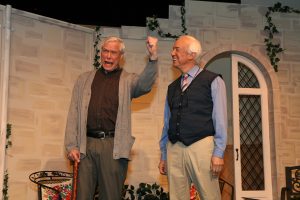
How do you feel about “Quartet” in particular?
What touches me about “Quartet” and this is a theme Ronald Harwood explores in some of his other writings– is that Harwood presents characters who have fallen from their pedestals, and, in many cases, fallen quite hard, but who both yearn for and work diligently toward reclaiming their former glory. There is a lot of cynicism that says one cannot climb back to the top of a mountain from whose apex he has tumbled; “Quartet” responds to that cynicism with a lovely story of four characters who are going to give it their damndest despite how high the mountain might go. I was really touched by my first reading of “Quartet,” and I’ve enjoyed watching its words evolve into nuanced and thoughtful performances by my cast.
Do you discuss directing around the dinner table? How do your sons respond?
We do, in fact. Our house is littered with play scripts. We also recently took turns reading John Ahern’s “The Director’s Eye.” In a lot of ways, theater and performance has become for us now what Kol Sasson was for us in college– a creative pursuit through which we build each other up. It’s a real pleasure to be able to shift from everyday concerns like, “What should we eat for dinner?” or “Who’s picking up the boys from school?” to theoretical conversations about whether the Puritan John Proctor would kiss his wife Rebecca within the confines of their home, or whether a particular word or phrase should be delivered thus or thus for best effect. I love how we’re able to use this mutual passion to support one another’s ambitions.
I don’t know that I’ve done directing enough to be able to compare it to Naomi’s style. I like to think we’re both actors’ directors because we both (she much more than I) started as actors. I know I tend to approach things very esoterically and that I am driven by research and scholarship. Naomi is much more driven by her actors manifesting true-to-life emotional reactions in performance. She cares about the work’s period and its underlying historical context, but not quite as much as she cares about good performance. I’m learning a lot from both talking to and watching her. It’s added a new dimension to our relationship.
I think, as committed as we are to theater and to acting, that we can have some positive influence on our sons’ future interests. It wasn’t until I played Bert in “Mary Poppins” that Micah (7) and Hirsch (4) expressed interest in theater. After the production– which included a cast of 21 children, ages 4 to 10–both boys asked if they could be in my next play. Unfortunately, they’re several decades too young to be in “Quartet.”
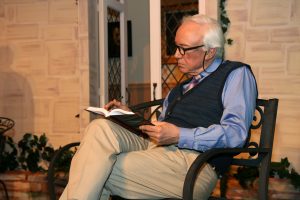
What are your theatrical goals for the future?
I’ve only been at this avocation for a couple of years. I’ve had the privilege of befriending thespians– professional actors– who’ve been pursuing this work for decades. I don’t imagine I’ll come to a place where acting becomes my main source of income, but I’d love to arrive at a place where I can be involved, frequently, with the many professional and semi-professional theater companies in the D.C.-Metro area. Though most of the work I’ve done has been voluntary through community theater groups, some of my jobs have been professional. It’s a powerful feeling walking off a film set or packing up from the Dinner Theater performance with money in one’s pocket.
Some of the pieces I’ve acted in are going to national film festivals; this will result in me having a presence on IMDB which could garner future roles. I have learned that a steady flow of work– auditions, training, connecting with peers, responding to casting calls, updating collateral materials like headshots and resumes– often begets more work. And, as performance is so much a part of my self-care routine, continuing to pursue it as far as it will take me feels like walking down a peaceful road into a picturesque sunset.
The British Players will perform “Quartet” through March 24 at Kensington Town Hall, 3710 Mitchell St., Kensington. Shows starts at 8 p.m. Friday and Saturday and 2 p.m. Sunday. Tickets are $22, $12 for children. Call 240-447-9863 or visit www.britishplayers.org.
A Special Operatic Afterglow: Following the 2 p.m. “Quartet” performance on Sunday, March 18, The American Center for Puccini Studies’ Dr. Harry N. Dunstan–operatic tenor, historical musicologist and raconteur–will lead live performances of operatic favorites and an exploration of the meaning of “An Operatic Existence.”